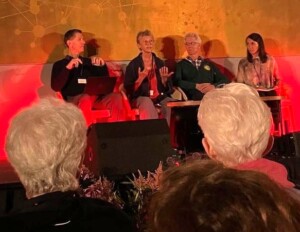
This month more than 850 Alexander teachers and trainees from all over the world met at University College Dublin for the 13th International Alexander Technique Congress. ‘The embodied mind in action’ congress reflected the broad scope of the Alexander Technique, encompassing areas as diverse as pain science, education, trauma and performance.
A whole day of this week-long congress was devoted to neuroscience and pain, and I was delighted to participate in the Question Panel for the keynote presentations by Professors Lorimer Moseley and Paul Little.
Lorimer Moseley is Professor of Clinical Neurosciences at the University of South Australia and is one of the founding members of the NOI group. NOI are renowned all over the world for their pioneering practical educational approaches to persistent pain. Taking up the current evidence-based biopsychosocial understanding of pain, they are challenging the old biomedical model that still persists in our culture, even among many healthcare professionals. Lorimer’s and NOI’s approach to working with persistent pain complements beautifully that of the Alexander Technique. The effectiveness of both modalities relies on our biological plasticity – we (our brains and bodies) are constantly changing and we can intervene to shape the direction of this change towards health and wellbeing (rather than entrenching existing habits). Both Alexander teaching and the NOI approach are tailored to the unique circumstances of each individual, aiming to empower them with the knowledge and skills that can help them steer themselves towards recovery. Finally, both approaches aim to facilitate movement in all its forms, particularly in finding ways that do not evoke pain in those for whom pain is an everyday experience.
There are, nonetheless, some areas of distinction between Alexander Technique teaching and the NOI approach to working with persistent pain. Alexander teachers use specialised, gentle touch to communicate and enable people to experience new ways of moving and being. We also show people how they can use their attention and awareness differently for positive change, including recovery from persistent pain. I discussed this with Lorimer and he was intrigued by what seemed to be a new concept for him. I hope that we piqued his interest in the Alexander Technique!
Later in the day, Professor Paul Little from Southampton University shared his plans for future research on evaluating the effectiveness of combined Alexander one-to-one lessons and group classes for musculoskeletal pain conditions (e.g. back, neck, hips and knee pain). Paul Little has already contributed a huge amount to our research evidence base with the large, randomised, controlled ATEAM trial, followed by several smaller studies, and he gave a useful, concise refresher on this work for us.
During the week in Dublin, there were several workshops and presentations on the role of Alexander Technique teaching for people living with trauma. There is a growing recognition in our profession and beyond, of the potential beneficial role that Alexander Technique can play, when used alongside other approaches. See my previous post which discusses some of the ways in which working with an Alexander teacher and learning the technique can be of great help for people living with trauma. Of course, Alexander teachers need to be appropriately trauma-informed and it is vital that this area should be part of the curriculum for training new teachers, as it is at Edinburgh Alexander Training School (historically, this was not the case and our profession is still catching up in this important area).
On a personal level, I really appreciated the opportunity to spend time with colleagues, to share work and ideas, and to meet with fellow teachers from all over the world. Particular workshop highlights for me were the one led by Nanette Walsh, and also Julia Outlaw’s tranquil and restorative Being in Nature with the Alexander Technique. Nanette Walsh does amazing work aimed at increasing accessibility to the Alexander Technique through the Sapienta Initiative in New York. Her workshop was inspired by what she learnt from first-generation Alexander teacher, Peggy Williams. Nanette took us through some of the ideas and practical skills from Peggy, and how she has further developed them over the subsequent years. She crystallised the Alexander Technique as being about ‘re-thinking thinking’.
Looking forward to the next International Congress in 2028!